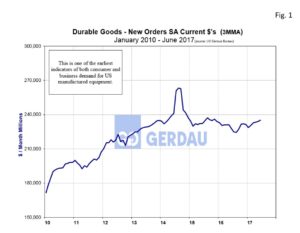Advanced Durable Goods Orders
New orders for durable goods (ADG), were flat month on month (m/m), in June at $236.0 billion. On a three month moving average (3MMA), assessment, ADG increased by 0.5% m/m and was up 3.2% year on year (y/y). Most of the monthly gains originated from strong nondefense aircraft orders. Excluding transportation, orders rose 0.2% m/m and were up 6% y/y.
The Advance Report on Durable Goods (M3), provides statistics on manufacturers' value of shipments, new orders, end-of-month unfilled orders and total inventory. Data are collected and tabulated by six-digit NAICS (North American Industry Classification System). The M3 is based upon data reported from manufacturing establishments with $500 million or more in annual shipments. Units June be divisions of diversified large companies, large homogenous companies, or single-unit manufacturers in 89 industry categories.
Transportation orders surged 19% m/m and were up 32% y/y, mostly as a result strong non-defense orders (Boeing), which ballooned 132% m/m and 275% y/y. Motor vehicles and parts orders lost 0.6% m/m but were up 3.9% y/y. Banks have started pulling-back on sub-prime auto loans which is negatively impacting sales and analysts expect this trend to continue. Orders in primary metals rose 0.1% and were up 11.5% y/y. Durable goods inventories rose 0.4% and were up 2.3% from a year earlier.
 Figure 1 shows the history of durable goods orders from 2010 to present. Figure 2
Figure 1 shows the history of durable goods orders from 2010 to present. Figure 2  shows the 3MMA y/y percentage change. The percentage change has been in positive territory for five of the past six months and on an upward trend since mid-2016, (green dotted line).
shows the 3MMA y/y percentage change. The percentage change has been in positive territory for five of the past six months and on an upward trend since mid-2016, (green dotted line).
Businesses still remains upbeat by historical standards but have softened somewhat since the election. Businesses, including durable goods producers have priced-in corporate tax reform as well as a significant infrastructure bill into its future plans. The ongoing healthcare debate, Russian election meddling as well as the pending debt ceiling discussions are combining to delay tax reform and infrastructure bills. Despite healthy consumer spending these policy concerns are likely to impact business performance and spending going forward.
At Gerdau, we routinely monitor durable goods orders since it provides a good read on the current health of the US manufacturing economy and its probable short-run future.

